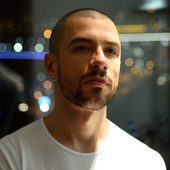
Marko Nikodijevic
Marko Nikodijevic was born in 1980 in Subotica, Serbia, and studied composition with Zoran Eric and Srdjan Hofman in Belgrade from 1995 to 2003. He also attended courses and lectures in nonlinear mathematics and physics, which provided diverse inspiration for his innovative compositional approaches. After completing his studies in the Serbian capital, a two-year postgraduate composition course with Marco Stroppa took him to the University of Music and Performing Arts in Stuttgart in 2003. Nikodijevic settled in Stuttgart, from where he also traveled to Apeldoorn, Visby, Weimar, Amsterdam, Salzwedel, and Baden-Baden for various scholarships, master classes, and composition seminars. From 2008 to 2009, he also took private music theory lessons with Bernd Asmus.
In 2012/13, Nikodijevic was Musician in Residence at the Cité Internationale des Arts in Paris. His music has been performed at festivals such as musikprotokoll im steierischer herbst, the Huddersfield Contemporary Music Festival, the Heidelberger Frühling, the Warschauer Herbst, the Wittener Tage für neue Kammermusik, the Donaueschinger Musiktage, Musica (Strasbourg), and by ensembles such as Asko |. The Schönberg Ensemble, the Ensemble intercontemporain, the Nieuw Ensemble, the Nouvel Ensemble Moderne, the SWR Symphony Orchestra, and the Basel Chamber Orchestra have included his works in their programs. Nikodijevic developed a special closeness with, among others, the Greek-Russian conductor Teodor Currentzis, who, like himself, radically disrupts traditional performance practices and audience expectations.
Nikodijevic's interest in spectral music and its shifting play with overtones, following Gérard Grisey's work, as well as his interest in Claude Vivier, characterize his work, as does his virtuoso use of electronic sound. In 2014, his chamber opera Vivier – Ein Nachtprotokoll, which revolves around the life and death of the Canadian composer who died much too early, premiered during the Munich Biennale. Nikodijevic's music also features cross-genre extensions, such as references to techno and pop music. In many of his works, the composer deals with exceptional psychological states, such as in Quartetto d'archi no. 1 „Tiefenrausch“ (2016) for string quartet, where he attempts to transform the most extreme, sense-numbing experiences into sound. The Serbian composer has also long researched the folklore of his Serbian homeland and the Balkans in general. Traces of this can be found repeatedly in his works. For example, in his music for the four-hour, large-scale installation project Balkan Erotic Epic by performance artist Marina Abramovic, who previously commissioned him to compose pieces for the worldwide project 7 Deaths of Maria Callas and continues to collaborate with him.
Marko Nikodijevic's musical language is highly idiosyncratic. His works also reflect numerous influences from avant-garde music, particularly from the second half of the 20th century, which he develops further and incorporates into experimental compositions. This includes, for example, his Concerto for Automatic Percussion and Orchestra, on which he collaborated with sound engineer Robert Henke. The titles of Nikodijevic's works are often confusingly complex and do not immediately reveal how they relate to the respective pieces. This applies, for example, to the piece ketamine/black for trumpet, trombone, guitar, cello, piano, two percussionists, and live electronics, which premiered at the Donaueschinger Musiktage. Or to gesualdo dub / space with deleted figure. Concerto for Piano and Ensemble and cvetic, kucica ... / la lugubre gondola for orchestra. Some of his works are based in part on works by other avant-gardists, which Nikodijevic compresses, stretches, and processes using electronic means. One example is music box / Self-portrait with Ligeti and Stravinsky, and Messiaen is also included, which is based on works by György Ligeti.
From 2012 to 2013, Nikodijevic held a scholarship at the Cité internationale des Arts in Paris. In 2013, he received one of the three composers' prizes from the Ernst von Siemens Music Foundation, and in 2014 he was awarded the German Music Authors' Prize in the category of young composers. He has received numerous awards, including the Composition Prize of the Brandenburg Biennale, First Prize at the 2010 International Gaudeamus Music Week for his piece cvetic, kucica ... / la lugubre gondola, the 2013 Ernst von Siemens Music Foundation Prize in Munich, and the 2014 GEMA German Music Authors' Prize. His works have also been recognized at the International Young Composers Meeting Apeldoorn, Gaudeamus Music Week Amsterdam, the 3rd Brandenburg Biennale, and the UNESCO Rostrum of Composers.
This biography can be reproduced free of charge in concert programs with the following credit: Reprinted by kind permission of Boosey & Hawkes/Sikorski.
